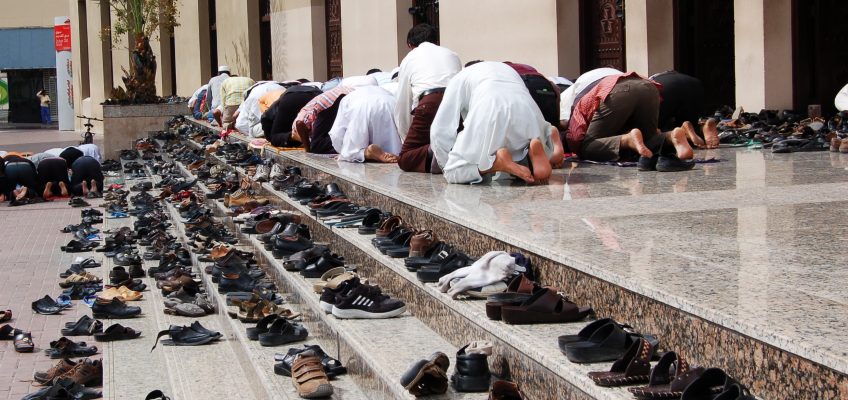We all know there are certain destinations where religion is strictly followed but do you know how to be respectful when visiting these countries?
Simple gestures and phrases can imply something very different in different cultures so, it’s really important to know what you should and shouldn’t do before travelling anywhere with strong religious views and beliefs.
Can you show affection? Is being in a same sex relationship legal? Can you drink alcohol?
It is easy to disregard certain or all religions, especially if you don’t follow any yourself. However, cultures, beliefs and customs can change drastically from place to place with quite severe consequences should they be disrespected publicly.
There is nothing worse than going on holiday to be met by some locals with judgement and contempt so, here we have put together some vital information for some of the world’s most practised religions.
Globally, the most popular religions are:
- Christianity – followed by roughly 37.5% of the world’s population
- Islam – 23.2%
- Hinduism 15%
- Buddhism 7.1%
- Other 5.9%
Let’s look at the main three in detail and see how best to act when overseas:
Christianity
You may think Christianity is very westernised and in some places it is but don’t be fooled into thinking you can’t disrespect someone who follows this religion. Some countries, especially throughout the Americas and Africa, take Christianity very seriously so, you should do your research before travelling there.
Christianity is the most practised religion around the world, being mostly followed throughout America, UK, Europe, South Africa, Australia, Russia and the Philippines. However, within Christianity there are many ‘sub-divisions’ which all follow a different set of beliefs. For example, Russia are mostly orthodox whereas Australians are mainly protestant.
Good Behaviour
Always respect any religious practices taking place when you are there. For example, some Catholic and Orthodox Christians fast every Friday. Most Christians are more than happy to discuss and teach their beliefs and customs so by all means ask them what they are doing and why? They will be happy to explain!
Don’t outwardly disrespect anyone’s religious beliefs. Wearing or displaying satanic or anti-religious clothing/symbology is asking for trouble. If you wear these types of items, that’s your choice and that’s fine, but don’t flaunt it somewhere where you know you will get a negative response. Either respect where you are or simply travel somewhere else.
Relationships and Conduct
When travelling through certain Christian countries, you may want to research if same sex couples are generally accepted and, in some cases, legal. Across Africa, 33 of the 54 nations criminalise homosexuality, with some places considering this a crime punishable by death. Extreme caution must be taken when travelling to these countries or simply avoided if you are placing yourself in direct danger.
Practices and Cultural Differences
Lent takes place during Easter for 40 days to celebrate the death and re-birth of Jesus Christ. This is 40 days of fasting, abstinence, prayer and almsgiving. This practice starts on Ash Wednesday for most but commences on Clean Monday for Eastern Catholics. During this time, Christians become very in touch with their religion but also could be more irritable than usual due to the abstinence practices that they follow so, plan your trip carefully if you want to avoid these dates.
If you really want to experience Christianity when travelling, visit during times of holy significance such as Easter, Christmas, Ascension or Pentecost. Churches, villages and town centres often host festivals, invite everyone to congregate and overall, invite you to participate in this celebration of their faith.
When entering a church or cathedral, always pay your respects by being as quiet as possible and not disturbing anyone during their prayer. If you wish to, some churches offer visitors the option to light a candle in a loved one’s memory – this is usually for a small coin donation.
Sunday is the day Christians visit church for prayer and song to worship their God and most of these churches will have an open-door policy i.e. anyone can attend to join in these practices with them. If this is the case, definitely get involved if you want to and meet some wonderful locals!
Islam
Muslims practice five calls to prayer a day, usually starting around 5AM. If you like a lay in, don’t book your accommodation near a mosque as you probably won’t like the early wake-up call every day.
Muslims are mostly located in the Middle East, North Africa and Indonesia.
Greetings and Phrases
If you enjoy fully immersing yourself in a new culture, learning key phrases is always met with a smile. A good one to note here is “Salamu Aaikum” meaning “Peace Be Upon You” and is used widely throughout Muslim countries to greet one another.
Another useful term to note is how to say thank you. There are two ways you can offers thanks, firstly, by formerly saying thank you which is ‘Shukran’ however, a more common term amongst Muslims is ‘Jazāk Allāhu Khayran’ which means ‘May Allah reward you [with] goodness’ and is a much more endearing way of thanking someone.
Clothing
One of the golden rules, and one we’re sure you have heard of, is don’t show too much skin. An easy way to know what to wear is by copying the locals. Some places allow men to wear shorts but if locals are all wearing long trousers and full-length shirts, for example, do this.
Ladies – cover as much skin as possible at all times. In South Arabia and Iran, the Hijab is worn by all women so it’s best that you do too unless you want to bring unnecessary attention to yourself. In other Middle Eastern countries, it may not be compulsory for women to wear hijabs however, if they do it is usually a sign of pride and not a sign of oppression. Always respect these views, whether you agree with them or not.
Public Affection
Don’t show too much public affection. Public displays of affection are not welcomed throughout Islamic countries and are seen as very disrespectful so, keep it for the bedroom and enjoy the surrounding cultures, sites and architecture when outdoors.
This sign of affection also applies when greeting new companions, especially of the opposite sex. Generally, you do not greet a member of the opposite sex but only shake hands or acknowledge members of the same sex. This may relax as you get to know them however, let them be the guide and do as they do. Muslims are very conservative, and it will always serve you best to remember this when visiting them.
Relationships and Conduct
Again, many countries in the Middle East discriminate heavily against same sex couples. Please find out whether where you are going legally acknowledge and accept same sex couples – knowing this will alleviate serious judgement, potential stress and/or criminal charges arising from your trip.
Mosques and Holy Dwellings
When entering any establishment, be it a mosque, religious dwelling, shop or home, observe if shoes are left at the door. All mosques or holy places require shoes to be removed before entering however, this can sometimes extend to shops and homes as well.
When entering a mosque be mindful not to walk in front of anyone during prayer. This is seen as extremely disrespectful and could cause great offence as you are breaking or disturbing their prayer.
Take note of whether there is any segregation when entering a mosque i.e. men in one area and women in another. If you are unsure of anything, ask – someone will happily explain the rules to you. For women, cover as much skin as possible and be aware if you need to cover your hair when entering the mosque.
Drinking
Drinking alcohol is not prohibited but be discreet and do not get drunk in public. If you know you enjoy a holiday tipple or two, research your destination beforehand to know if this is acceptable behaviour. If this will affect your trip, consider staying somewhere else and engaging in drink-free day trips or excursions to other places you want to experience.
Practices and Cultural Differences
Think about when you want to travel to your chosen destination as there are times that may alter the experience you have. Ramadan is followed during the ninth month of the Muslim year. During Ramadan, Muslims fast from dawn to sunset. This means places such as cafes and restaurants may not be open during the day, only opening in the evening as everyone is fasting throughout the day.
Personal Space
Be ready for all sorts of attention. Depending on where you travel this can be very different. For example, Egypt can be known for its comments and looks towards women, whereas Iran is renowned for its welcoming attitude towards tourists. Whatever the situation, be open minded and courteous and you should get along just fine!
Something a Little Different
An unusual practice for many Westerners to witness is the water hose next to the toilet. Muslims believe you should wash after visiting the toilet, so this is how they do so. You can join in this practice should you wish to but don’t, whatever you do, use this hose to wash your hands or face.
Hinduism
Hinduism is mostly practised throughout South Asia and, when it comes to tourist behaviour, has many similarities to Islam. For example, do not show an unnecessary amount of skin and do not display too much affection in public.
Hindus do have some very specific differences however when it comes to particular behaviours.
Greetings and Phrases
To say hello to a Hindu, use the term ‘Namaste’ which is a respectful greeting and will be much appreciated coming from a visiting tourist.
If you break down the word Namaste, it has three sections – The first, ‘Nama’ means bow. The second, ‘as’ means I and the third part, ‘te’ means you. Therefore, namaste actually means ‘I bow to You’.
Namaste can also be used as a casual way to say goodbye!
Practices and Cultural Differences
Hindus believe that pointing is very rude whether it be with your hands or feet. Feet especially are considered very unclean, so you can cause serious offence by pointing at something with your toes or touching anything with your feet.
On the other hand, it is a sign of great respect to bend over and touch the feet of an elderly person!
Good Manners or Bad Manners
To us, saying please and thank you are considered good manners however, Hindus believe these to be very formal and if said too much, can be disrespectful. If you are among friends or family, compliments are considered more casual so, instead of saying ‘thank you so much for having us’, pay them a compliment instead such as ‘the food was delicious, and we have had a wonderful evening in your company’. This will be taken much better by the hosts and help maintain a more relaxed atmosphere instead of treating them as a business associate or formal acquaintance!
Personal Space
Prepare yourself for the lack of space in some of these destinations. Overall, you won’t get much but especially in a queue, for example, everyone stands together in a very tight line to stop anyone else jumping in. Of course, always protect your belongings but bear in mind this is a cultural behaviour and one you will need to get used to when travelling to Hindu countries.
Wherever you go, do your research before departing and have a good understanding of the type of behaviour you should display when visiting destinations with huge cultural differences. Ask your travel agent, get some holiday guides or trawl the internet. By knowing what your stepping into, you will minimise any stress or misunderstandings when overseas.
If you need to find out further information regarding the safety and risks associated with your destination of travel, please visit the Smartraveller website here.


